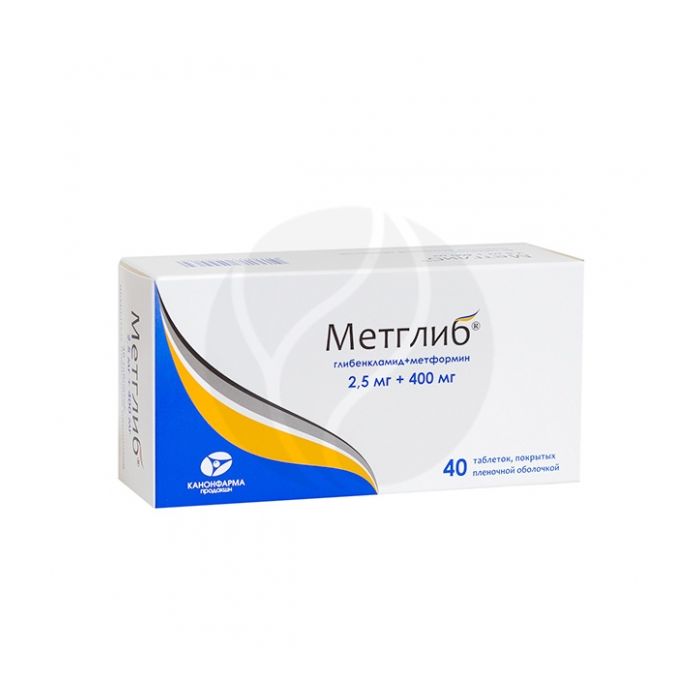Metglib tablets 400 + 2.5mg, No. 40
Russian Pharmacy name:
Метглиб таблетки 400+2,5мг, №40
For oral administration, with meals. The dosage regimen is selected individually. Typically, the initial dose is 2.5 mg glibenclamide and 500 mg metformin, with a gradual selection of the dose every 1-2 weeks. depending on the glycemic index. The maximum daily dose is 2.5 or 5 mg of glibenclamide and 500 mg of metformin.
Film-coated tablets
1 tab. glibenclamide 2.5 mg
metformin hydrochloride 400 mg
Type I diabetes mellitus;
diabetic ketoacidosis;
diabetic precoma and coma;
lactic acidosis (including history);
renal failure (creatinine more than 135 mmol / l in men and more than 110 mmol / l in women);
acute conditions that can lead to impaired renal function (including dehydration, severe infections, shock, intravascular administration of iodine-containing contrast media);
acute and chronic diseases accompanied by tissue hypoxia (including heart failure, respiratory failure, recent myocardial infarction, shock);
liver failure;
acute alcohol intoxication;
porphyria;
simultaneous administration of miconazole;
pregnancy;
lactation period;
hypersensitivity to the components of the combination.
With care
Alcoholism, adrenal insufficiency, hypofunction of the anterior pituitary gland, thyroid disease with impaired function.
pharmachologic effect
Oral combined hypoglycemic agent, sulfonylurea derivative of the second generation.
Has pancreatic and extra-pancreatic effects.
Glibenclamide stimulates insulin secretion by lowering the threshold for glucose irritation of beta cells of the pancreas, increases insulin sensitivity and the degree of its binding to target cells, increases insulin release, enhances the effect of insulin on glucose uptake by muscles and liver, inhibits lipolysis in adipose tissue. Acts in the second stage of insulin secretion.
Metformin inhibits gluconeogenesis in the liver, reduces the absorption of glucose from the gastrointestinal tract and increases its utilization in tissues; reduces the content of triglycerides and cholesterol in blood serum. Increases the binding of insulin to receptors (in the absence of insulin in the blood, the therapeutic effect is not manifested). Does not cause hypoglycemic reactions.
The hypoglycemic effect develops after 2 hours and lasts 12 hours.
Pharmacokinetics
Glibenclamide is quickly and completely (84%) absorbed in the gastrointestinal tract, the time to reach Cmax is 7-8 hours.
Communication with plasma proteins - 97%.
Almost completely metabolized in the liver to inactive metabolites.
50% excreted by the kidneys, 50% - with bile. T1 / 2 - 10-16 hours
Metformin after absorption in the gastrointestinal tract (absorption - 48-52%) is excreted by the kidneys (mainly unchanged), partly by the intestines. T1 / 2 - 9-12 hours
Side effect
From the digestive system: nausea, vomiting, abdominal pain, decreased appetite, 'metallic' taste in the mouth, decreased absorption and, as a result, the concentration of cyanocobalamin in the blood plasma (with prolonged use), discomfort in the epigastric region, increased activity of hepatic transaminases, hepatitis.
On the part of the skin: erythema (as a manifestation of hypersensitivity), photosensitivity, pruritus, maculopapular rash (including on mucous membranes), urticaria.
Metabolic disorders: lactic acidosis, hypoglycemia, cutaneous and hepatic porphyria; hyponatremia, hypercreatininemia, increased plasma urea.
From the hematopoietic system: leukopenia, thrombocytopenia, agranulocytosis, hemolytic anemia, bone marrow aplasia, pancytopenia.
Others: disulfiram-like reactions (with simultaneous use with ethanol).
Application during pregnancy and lactation
Contraindications: pregnancy; lactation period.
Application for violations of liver function
Contraindication - liver failure.
Application for impaired renal function
Contraindication - renal failure (creatinine more than 135 mmol / l in men and more than 110 mmol / l in women).
special instructions
Major surgical interventions and trauma, extensive burns, infectious diseases with a febrile syndrome may require the withdrawal of oral glypoglycemic drugs and the appointment of insulin.
It is necessary to regularly monitor the blood glucose level on an empty stomach and after meals, the daily curve of blood glucose.
Patients should be warned about the increased risk of hypoglycemia in cases of taking ethanol, NSAIDs, and fasting.
Dose correction is necessary in case of physical and emotional overstrain, changes in diet.
It is prescribed with caution against the background of therapy with beta-blockers.
For symptoms of hypoglycemia, carbohydrates (sugar) are used, in severe cases, a dextrose solution is slowly injected intravenously.
It is necessary to cancel the drug 2 days before any angiographic or urographic examination (therapy is resumed 48 hours after the examination).
Against the background of the use of ethanol-containing substances, the development of disulfiram-like reactions is possible.
Influence on the ability to drive vehicles and mechanisms
During the period of treatment, care must be taken when driving vehicles and engaging in other potentially hazardous activities that require increased concentration of attention and speed of psychomotor reactions.
Drug interactions
Miconazole - the risk of developing hypoglycemia (up to coma).
Fluconazole - the risk of hypoglycemia (increases T1 / 2 of sulfonylurea derivatives).
Phenylbutazone can displace sulfonylurea derivatives (glibenclamide) from the connection with proteins, which can lead to an increase in their concentration in blood plasma and the risk of hypoglycemia.
The use of iodine-containing X-ray contrast agents (for intravascular administration) can lead to the development of renal dysfunction and the accumulation of metformin, which increases the risk of lactic acidosis. Treatment with the drug is canceled 48 hours before their administration and resumed no earlier than 48 hours later.
The use of ethanol-containing agents against the background of glibenclamide can lead to the development of disulfiram-like reactions.
GCS, beta2-adrenostimulants, diuretics can lead to a decrease in the effectiveness of the drug; dose adjustment may be required.
ACE inhibitors - the risk of developing hypoglycemia with the use of sulfonylurea derivatives (glibenclamide).
Beta-blockers increase the incidence and severity of hypoglycemia.
Antibacterial drugs from the sulfonamide group, fluorochonolones, anticoagulants (coumarin derivatives), MAO inhibitors, chloramphenicol, pentoxifylline, hypolipidemic drugs from the fibrate group, disopyramide - the risk of hypoglycemia during the use of glibenclamide.

